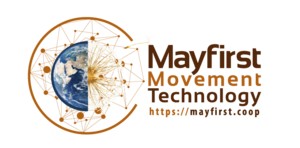May First Movement Technology Podcasts
May First Movement Technology tiene un podcast! Recibimos una variedad de contenido de audio. Vea abajo para más detalles.
Escucha
Todos los espectáculos se muestran a continuación. Disfrute navegando a continuación o suscríbase a nuestro podcast (). O, podcast.
-
El rol de la tecnología en la red Rising Majority
Una conversación con Alice Aguilar y Jerome Scott sobre el papel de la tecnología en la estrategia de los movimientos.

La red de Rising Majority, Mayoría Creciente, se formó en 2017 como “una coalición que busca desarrollar una estrategia colectiva y una práctica compartida que involucrará a fuerzas sindicales, juveniles, abolicionistas, de derechos de los inmigrantes, de cambio climático, feministas, antiguerra/antiimperialistas y de justicia económica con el fin de amplificar nuestro poder colectivo y construir una alineación entre nuestros movimientos.”
En 2020 May First se unió a la red de Rising Majority para apoyar este esfuerzo aportando nuestra experiencia en tecnología y construcción de movimientos. Por favor, ¡ayúdanos a cumplir esta tarea! Acompaña a Alice Aguilar y Jerome Scott, miembros de la Junta Directiva de May First, a discutir el papel de la tecnología en la construcción de dicha estrategia.
Comentarios de los participantes
Estos son algunos de los comentarios sobre las preguntas de los participantes.
- Is there interest in placing a priority on ‘supply-chain’ and labor isues relating to the provision of critical materials for the infrastructure that supports web-related movement work? Thinking about worker and environmental conditions with cobalt & lithium mining, colonial legacies, the stuff that phones and laptops and servers are built from.. etc.
- How does Rising Majority feel about FOSS? It denies ‘realization’ to capitalist tech companies. FOSS social media can also bypass attempts at censorship.
- Is Rising Majority only for US or has an ambition to go abroad?
- Information Technology has not only became a lifeline for Capitalism in crisis it has quickly become the primary driver of the neoliberal economy and it will be intricately connected to all other movement struggles.
- It is obviously a huge contradiction that Anti capitalist movement organizations have adopted en masse the worst of the worst of surveillance capitalism driven information technology platforms. There is no denying that these tools have really helped movements expand their reach and facilitate their work in meaningful ways. But there is already and will continue to be a huge price for routing all movement communications through these corporations who are in full cooperation with the state when it comes to surveilling our movements and controlling public opinion.
- All technology that is not guided by movements for liberation and social justice will become carceral technology. This is why the May First project and others are so important. How can we inspire our comrades in Rising Majority to take interest in what we are doing and begin thinking about how they can chart a path out of those corporate internet services?
- Why doesn’t RM notice technology as a critical issue? What’s the need for us as a movement to
- get folx to notice that tech is a crucial element and always has been present as, a factor in oppression (eg the Luddites). Are we too overinvolved in our academic-type and identitarian focuses?
- I’m curious as to how RM sees its relationship to groups that are not 501c3 or c4 organizations with paid staff. I guess I"m assuming that the groups do have paid staff, is that true or partially true?
- There is SO MUCH to talk about technology and its impacts! Maybe we should concentrate on how techonology affects social movements and our relations..which I believe is basically the issues of privacy and autonomy..that is the right to organize and discuss privately and the right to communicate freely, that is on platforms that we control, with no commercial interference and data collection without consent
- The discourse of Power and revolution changed dramatically within movements in Mexico after the Zapatista uprising in 1994 and a grassroots strategy that seeks to “change the world without taking power” became a very influential political vision here.
- There is a difference between authoritarian “Power over something” and agency and autonomy, the “power to do something” which I want to believe movements who use a discourse of power are really talking about.
- People talk about global but the reality is the majority of the world remains unconnected… technology affects them in the ways that it the neoliberal economy it fuels displaces these people, consumes their natural resources and destroys their environments and forces them to migrate.
- Tech made it possible for capitalism to go global - the shift to computerization and high speed digital info transfers.
- When talking about technology being used for the rich, I think about how Cuba uses technology for the people. I need to raise this question to friends in Cuba who I’m still in contact with.
- y la tecnología digital no debe ser “obligatoria” o la única forma de acceso (vivas donde vivas)
- The Internet started based on open source tech, and it still runs on that, eg. the DNS system. We simply do not take advantage of this; the answer is to stop using tech that exploits us and move to using and creating more and more open tech.
- this is where it’s great ot understand the history of tech and specifically how it relates to our movements - and how it’s changed - we used to control our tech (for a brief moment)
- “For Indigenous nations to live, capitalism must die. And for capitalism to die, we must actively participate in the construction of Indigenous alternatives to it.” - - Glen Sean Coulthard - Red Skin, White Masks: Rejecting the Colonial Politics of Recognition (p. 173)
- +1 to above, and noticing that we need to be building alternatives to capitalism too. We need anti-capitalist technology and we will have to create it ourselves.
- Yes, we can’t just be constantly against something or other, taking it down, deconstructing it. We have to be for something, to be constructive. Where would we be if tomorrow, capitalism and authoritarian domination was gone, where would we be. Are we prepared for that eventuality?
- We will need to build on feminist and intersectional thinking that has evolved approaches to how we engage and interact with one another - human relations technology that can enable organizations that do not use hierarchy and domination, but do have conflict transformation capacities and egalitarian power-to instead of power-over. We need to build structures in which people can learn to live that way.
- What about dual power? Do we have to take over the existing structures begin creating our own autonomous solutions?
- I’m optimistic, but I don’t think we’ll get rid of capitalism in the near future. So, I think we need to figure how to use technology to move our social justice movements in this country now.
- Here’s the link to Freedom Circles signup if anyone would like to join us! (Rising Majority) https://linktr.ee/freedomcircles
- I would narrow the scope about technology and a group like RM to technology that supports building movements (security and organizing needs)- as opposed to spending time on the “other” issues about technology.
- We need to be working more closely with comunity network projects.
- right on! love where this is going…it also makes me think about the impact of tech within the context of climate collapse & healing the planet.
- I’m curious how AI will impact our technology and our movements.
- there is SO MUCH to talk about technology and its impacts! Maybe we should concentrate on how techonology affects social movements and our relations..which I believe is basically the issues of privacy and autonomy..that is the right to organize and discuss privately and the right to communicate freely, that is on platforms that we control, with no commercial interference and data collection without consent
- yes how do we change the world without taking power!
- What technologies do we use to fight capitalism? FaceBook? Twitter, email lists?? What social media can we use?
- totalmente! ser solidaries sin paternalismos sino desde (re)vincularnos con esas luchas
- my work experience in technology has led to opportunities to provide technical support for organizing outside the U.S. I don’t feel like organizers elsewhere need my opinion on their work
- y la tecnología digital no debe ser “obligatoria” o la única forma de acceso (vivas donde vivas)
- this is where it’s great ot understand the history of tech and specifically how it relates to our movements - and how it’s changed - we used to control our tech (for a brief moment)
- some years ago, I visited a digital technology center in Havana. They were very current then and I suspect they are still are
- We need to be working more closely with comunity network projects.
-
Aumentando la presión sobre las grandes empresas tecnológicas
La violencia del apartheid en los Territorios Ocupados Palestinos, las brutales represalias contra los trabajadores de los almacenes, la criminalización y la violencia contra las comunidades racializadas en todo el mundo dependen de la infraestructura del capitalismo de vigilancia, en gran parte alimentada por los contratos militares y policiales de Google y Amazon. Acompáñanos en un panel que reunirá a las voces del movimiento que están denunciando el papel de Google, Amazon, Zoom, Facebook y otros en el mantenimiento y la expansión de la violencia estatal.
Los ponentes serán Matyos Kidane (Stop LAPD Spying), el Dr. Rabab Abdulhadi y Jonathan Bailey (Amazon International).

-
Sacar la tecnología de mi cuerpo: grabación y recursos
Anular el caso Roe v. Wade en Estados Unidos y restringir el acceso al aborto en todo el continente americano es parte de una estrategia de represión que se centra en nuestres cuerpos. La estrategia no sólo afecta la justicia reproductiva, sino también los derechos de las personas transgénero, la movilidad de las personas pobres y de color, y el acceso a la atención sanitaria y otros servicios críticos. En este seminario web, escucharemos a personas afiliadas de May First en esta lucha y discutiremos la relación entre las luchas por la justicia reproductiva, la privacidad, la autonomía y la libertad de la vigilancia. ¿Cómo puede nuestre campaña para replantear la tecnología basada en el consentimiento y la liberación contribuir a la lucha de nuestre movimiento por la justicia reproductiva.
El 21 de junio de 2022 May First, juntes con personas miembres de May First, el Progressive Technology Project, la National Network of Abortion Funds, y la Detention Watch Network, organizamos un seminario web para discutir las implicaciones tecnológicas de la anulación de Roe v. Wade.
Clic arriba para escuchar, o vea la colección de recursos que las panelistas y les participantes recopilaron durante el seminario web.
Recopilación de recursos del seminario web
- Riana’s blog post about abortion privacy & encryption
- EFF abortion privacy & security tips
- Talk about abortion criminalization, “Jailed by a Google Search”
- Politico article about abortion privacy & security (6/20)
- “My Body, My Data Act”
- Ale Link Tree
- American Dragnet Data-Driven Deportation in the 21st Century
- Defunding the Dragnet
- End Abusive Surveillance of Immigrant, Black & Brown Communities
- Hacking//Hustling
- EFF - Street Level Surveillance
- Detention Watch Network: Defund Hate
- Mijente No Tech For ICE Campaign
- Time Magazine - Abortion Surveillance
- Digital Security for Abortio Poster
- From Data Criminalization to Prison Abolition
- De-criminalize Abortion
- Facebook tracking abortion
- Shout your abortion
- Join Mayfirst or if a member, get involved
Panelistas

Alejandra Poblas es una organizadora de la justicia reproductiva y narradora en las intersecciones de la encarcelamiento masivo e inmigración. Ella comparte su historia de encarcelamiento y aborto como un acto de resistencia para luchar contra el estigma del aborto y concienciar sobre la la abolición y la justicia racial.

El trabajo de Alice Aguilar (moderadora) se centra en apoyar los derechos de los pueblos indígenas, la justicia ambiental y la justicia reproductiva reproductiva. El trabajo actual de Alice consiste en liderar la lucha contra el racismo racismo y el sexismo en la tecnología, incorporando a las mujeres, a las personas queer y trans de color al movimiento y ganarse el respeto de la gente de color que ya trabaja en tecnología dentro de los movimientos de justicia social. de color que ya están trabajando en tecnología dentro de los movimientos por la justicia social.

Riana Pfefferkorn es una investigadora Scholar en el Observatorio de Internet de Stanford. Investiga las políticas y prácticas de Estados Unidos y y otros gobiernos para forzar el descifrado o influir en el diseño influir en el diseño de la seguridad de las plataformas y los servicios, dispositivos y productos productos en línea, tanto por medios técnicos como a través de los tribunales y las legislaturas. Riana también estudia las nuevas formas de vigilancia electrónica y acceso a los datos por parte de de datos por parte de las fuerzas del orden de Estados Unidos y su impacto en las libertades civiles.

Tecnología del movimiento May First se involucra en la construcción de movimientos mediante el avance del uso estratégico y el control colectivo de la tecnología para las luchas locales, la transformación global y la emancipación sin fronteras.

Kim Varela-Broxson trabaha con la National Network of Abortion Funds. La National Network of Abortion Funds construye el poder con los miembros para eliminar las barreras financieras y logísticas para el acceso al aborto mediante centrando a las personas que tienen abortos y organizando en las intersecciones de justicia racial, económica y reproductiva.
-
Historia oral del Partido Socialista Puertorriqueño que hay que conocer
Durante la década de 1970, el Partido Socialista Puertorriqueño fue la mayor y más organización revolucionaria puertorriqueña más grande y poderosa de los EE.UU. y una fuerza importante dentro de la izquierda estadounidense. Un libro recientemente publicado (Revolution Around the Corner: Voices from the Puerto Rican Socialist Party in the United States), escrito por personas involucradas en del PSP de entonces, ofrece una historia oral llena de lecciones sobre la organización y su trabajo. Este Need to Know presenta a algunas de esas personas.
Este es un evento al que toda persona interesada en cambiar este país debería asistir. Las lecciones de ese período y esa organización son de gran valor hoy en día.
Nota: Debido a dificultades técnicas, sólo se grabaron los primeros 10 minutos de la se grabaron los primeros 10 minutos.
La presentación de diapositivas a la que se hace referencia en la charla está disponible para descargar.
-
Ame Elliot Ux Design For Shifting Power Tias
Diseño de UX para el cambio de poder
2021-07-02: Ame Elliot habla sobre su trabajo en Simply Secure ofreciendo soporte de diseño y asesoramiento para proyectos tecnológicos que centran y protegen a las poblaciones vulnerables. Sigue la presentación pdf

Ame Elliot es Directora de Diseño de Simply Secure, una organización educativa sin ánimo de lucro conformando una comunidad que sitúan a las personas en el centro de la privacidad, la seguridad, la transparencia y la ética.
Referencias adicionales:
- Biblioteca de patrones para la descentralización
- Base de conocimientos de Simply Secure
- Derechos de para personas participantes
- Maquetas
- Hazlo físico, imprímelo, fíjalo con alfileres
-
Nechari Riley - Investigación centrado en el ser humano
Nechari Riley - Investigación centrado en el ser humano
2021-07-25: Nechari Riley nos comparte reflexiones sobre su viaje para convertirse en una investigadora de diseño UX del “poder popular”. Sigue la presentatión pdf

Nechari Riley es una investigadora y estratega de métodos mixtos que trabaja con organizaciones para desarrollar proyectos basados en la investigación que sean inclusivos, accesibles y atractivos.
-
Victoria Barnett - Justicia de Diseño
Victoria Barnett - Justicia de Diseño
2021-06-18: Victoria Barnett nos presenta los Principios de Justicia de Diseño y su trabajo apoyando el crecimiento de la Red de Justicia de Diseño. . Sigue la presentación pdf

Victoria Barnett es diseñadora de gráfica digital, facilitadora, organizadora comunitaria y colaboradora al servicio de iniciativas de justicia social. Su trabajo se basa en los Principios de Justicia de Diseño.
Referencias adicionales
- Cómo se generaron los principios de justicia de diseño, Véase el ejercicio del diagrama de Venn.
- Preguntas útiles para hacer, ver página 7
- Consejos sobre cómo organizar un nodo local Puede aplicarse al grupo de trabajo
- Zines
-
Free Software During Corona Virus Pandemic
TBD
- What Is Going On In Nicaragua Es
- Spectre Meltdown Webinar


